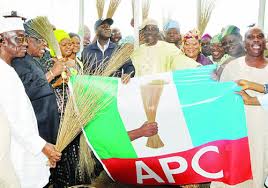Eight weeks and five days were wasted on resolving one crisis after another since the inauguration of House of Representatives on June 9, 2015.
It was only at dawn on Thursday, July 30 that Speaker Yakubu Dogara said during the inauguration of the All Progressives Congress (APC) House Caucus at the National Assembly (NASS) that all the conflicts had been resolved.
“There are no more factions in the House. What we have today is a group of lawmakers loyal to the House leadership and our great party,” Dogara declared.
Legislators are now ready to face the serious work of lawmaking for the good governance of Nigeria.
Ordinarily, it is cheery news. But I refuse to celebrate.
From the distance, I see a disorganised APC leadership, muddled in the indispensable party supremacy concept which party executives wrongly equate with powerful individual leader’s wishes imposed on the institutions of national governance.
As such, papering over the cracks as a resolution of the crisis only presages more conflict and more wasted legislative hours ahead.
Worse, the APC seems to lack a self-correcting mechanism to know when the party goofs and must pause and rechart the path to right its wrongs. Rather, its leaders prefer to bulldoze their way like bulls in a China shop.
The APC would rather marginalise the whole South East to install one popular Femi Gbajabiamila – who lacks the understanding to accept the Deputy Speaker position offered on a silver platter on June 9 – in order to waste legislative hours agitating for House Leader.
Both Dogara and Gbajabiamila claimed after their accord that they would compensate the South East.
The most appropriate “compensation” in my view is for Gbajabiamila to relinquish his post so that the South East can be accommodated in the House principal offices. That compensation would restore both the House tradition and federal character principle to hold sway with one principal officer per zone.
Anything short of that is papering over cracks which will widen into gullies.
The perception of South East marginalisation in the NASS could not have come at the most inappropriate time.
President Muhammadu Buhari had wisely stayed neutral in the crisis until the Dogara Formula was mooted. The formula “marginalised” Gbajabiamila.
Then pressure was mounted on Deputy Speaker, Yusuf Lasun, who dug in his heels and refused to resign to make way for Gbajabiamila.
The unseen hands of Aso Rock waded in for Gbajabiamila. It was reported on Tuesday, July 28 that he and Dogara sealed their horse trading in the office of the Clerk of the House.
Unwittingly, the impression was created that the entire rift and wasted time were only mired in confusion until Gbajabiamila was put in the House Leader post. Worse, it reinforced the perception, rightly or wrongly, that Buhari hates the South East and the Igbo.
Buhari’s critics already have a tall list of his “marginalisations” to support their criticisms.
They note, for instance, that six security and intelligence chiefs were appointed last month and not one came from Igboland. Instead, the North East got the extra appointee. The appointment of an acting Director General for the Nigerian Maritime Administration and Safety Agency (NIMASA) was reversed because the man is Igbo.
In the legislature, the South West got undeserved extra post of House principal officer while, for the first time in the history of the legislature, Igbos are marginalised there, too.
As many people reasoned recently, Buhari’s constituency covers the whole nation, including those who did not vote for him. For, even in the losing South East and South South zones, some outstanding individuals aided his election more than in some winning zones.
Former Rivers State Governor, Rotimi Amaechi (South South), and Imo State Governor, Rochas Okorocha (South East), are often cited, among others, as APC chieftains who contributed most to Buhari’s election like former Lagos State Governor, Bola Tinubu.
House member, Austin Chukwukere (APC, Ideato North/South, Imo), criticised the peace deal, saying: “We are not happy over our exclusion. Our constituents have been calling us over this development, and we have not heard from the party why the injustice should be meted out to us.”
What played out as a House peace resolution was an imposition of the wish of a cabal, political jobbers and unappointed advisers. They will melt into obscurity to resurface around the centre of power if Buhari fails.
Nigeria is not yet a nation which recognises equality of all. It is a disparate ethnic, religious and geographical jumble with groups angling with schemings at all times to corner up whatever they can.
Both the Senate and House are quiet now. It is not an unproductive peace of the graveyard. But it may not make democratic, level playing field of governance any easier going forward.
For the legislators, no prestigious position is reserved for the best contributors to good governance. For the party, it goofed twice with a mock election which ended as a blunder; then a list which led to a fiasco in the House.
Now is the time to hands off the legislature’s matters except behind closed party doors. Nigerians still await the dividends of good, democratic governance.













